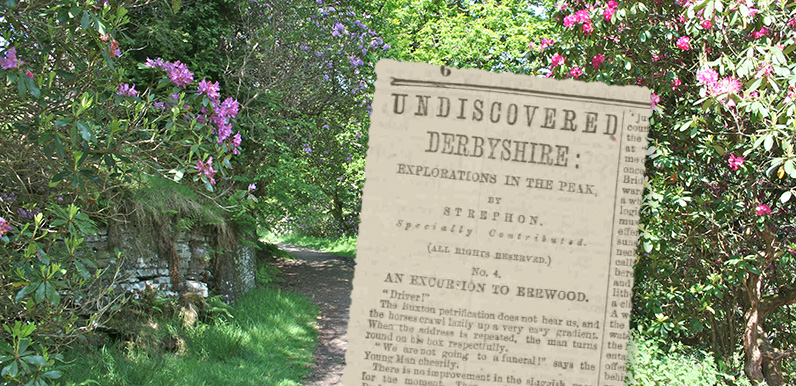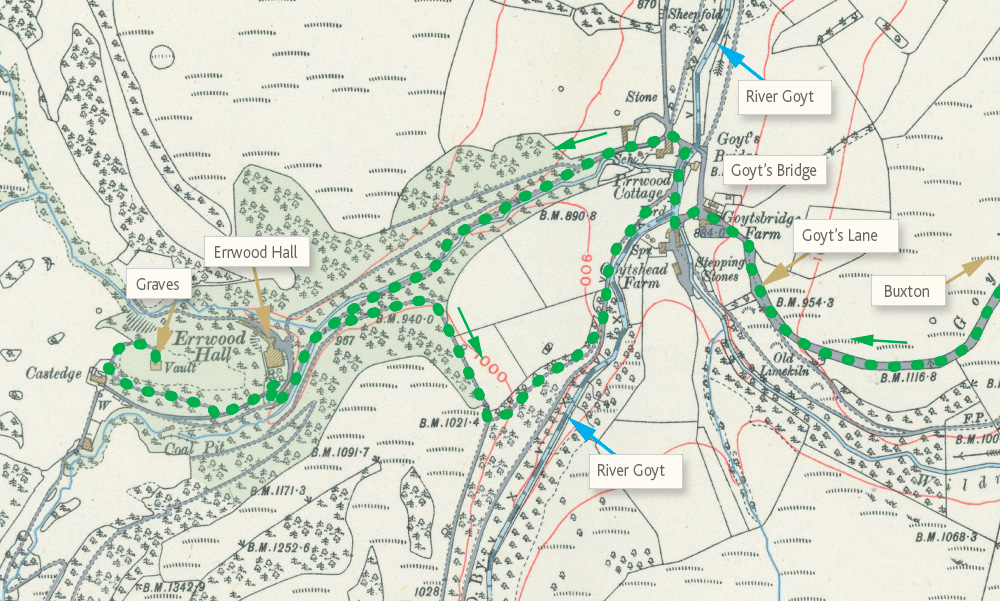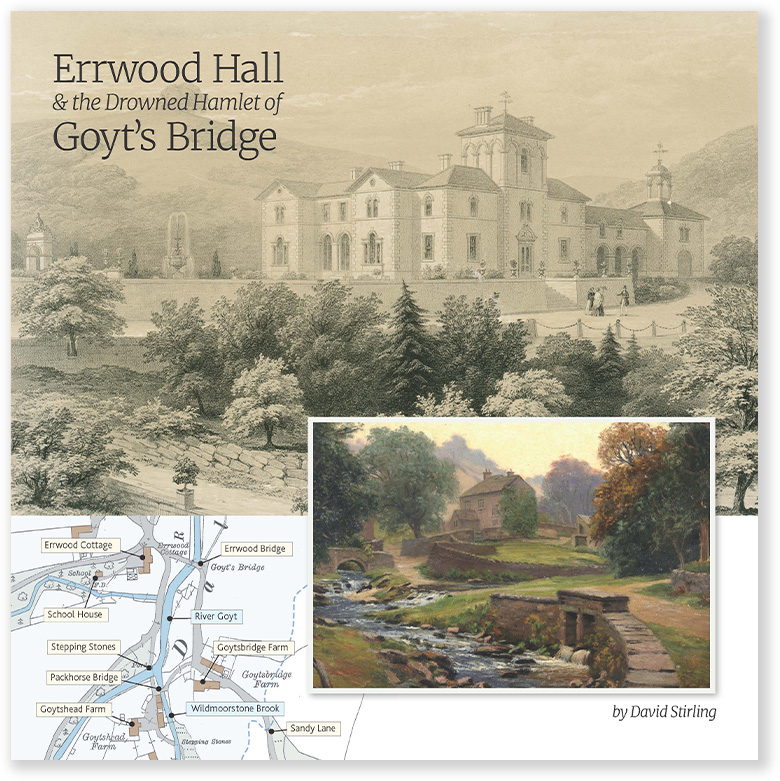At this time, the Cromford & High Peak Railway was still running along the Bunsall Incline (it closed in 1892). The driver dropped them off at the top of the incline, and they walked down Goyt’s Lane, on the left, to reach the hamlet of Goyt’s Bridge.
Crossing over the packhorse bridge, they turned right and soon came to the gates to Errwood Hall on their left. They then walked along the entrance drive to view the hall, and went on to visit hill-top graves.
I’m not 100% sure which route they returned along. Strephon mentions a ‘footpath on the right high above the carriage way’ which he describes as like a ‘lover’s walk’. I’ve marked on the map where this may have been.
My thanks to Mike for finding this report of a visit to Errwood in an 1880 edition of The Derbyshire Times. It’s written in wonderfully eloquent style and the author clearly loves the natural beauty of the Goyt Valley, but is less than impressed with the intelligence and wit of the locals!
UNDISCOVERED DERBYSHIRE: EXPLORATIONS IN THE PEAK BY STREPHON. No. 4: AN EXCURSION TO ERRWOOD.
“Driver!”
The Buxton petrification does not hear us, and the horses crawl lazily up a very easy gradient. When the address is repeated, the man turns round on his box respectfully.
“We are not going to a funeral!” says the Young Man cheerily.
There is no improvement in the sluggish pace for the moment. Then, quite suddenly, the Derbyshire Jebu breaks out into a spasm of wiry activity. He tugs the reins, brandishes the whip, shouts to the pair of horses, and away we go at a reasonable trot.
The mortuary observation only took a minute or two to make its occult meaning clear, which is, indeed a very short space of time for the average Peak intellect to receive and understand a joke.
Sydney Smith, who must be credited with the few good things Shakespeare left unsaid, placed the assertion on record that it requires a surgical operation to get a joke into the head of a Scotchman; and it is said that at a supper-party, and in passing a plate, Theodore Hook made a madly-outrageous pun that convulsed with spontaneous merriment everybody in the room but one man, who did not even smile, but who, more than an hour afterwards, and to the surprise of all, abruptly broke out into the broadest of laughs and complimented the wag on the joke he had made over supper.
That man must have been either Scotch or Derbyshire born. Misty hills must induce a mental melancholy that the sunshine shaft of wit takes time to pierce. Not that there was much of the sunshine shaft of wit in the remark we made to our charioteer. But even so transparent a joke took careful consideration.
May is merging into June, and we are bound, for the home of the Rhododendron; Errwood.
Topographically I may be wrong in including Errwood in Undiscovered Derbyshire. Really it is in Cheshire, but it only belongs to that country by the width of the little river Goyt. As any rate Errwood is in the Peake countrie, and only a matter of four or five miles from Buxton.
This old map shows the route our two friends probably followed that May day back in 1880 (click to enlarge).
So the charioteer is dismissed with instructions to pick us up again at the same place at the close of the day. Leave we artist and angler awhile to their amusements, while we stray round Errwood.
Instead of taking the turn to the left at Goyts Bridge, and following the road up the river, we pursue the road to the right. A walk of a hundred yards bring us to the lodge gates of the Errwood. The carriage drive up to the Hall is before us.
Be not deceived by the appellation carriage drive. Conjure up no decorous roadway of mathematically ruled gravel, dissecting methodically shaven grass. Imagine no stiff roadway as “county family” as the severe Squire that owns it.
There is nothing formal about this carriage drive. It turns at the bottom of a wild valley, where nature assumes one of her most romantic moods.
A blithe mountain stream sings by its side all the way. Bold rocks and steep wooded slopes shut it in on either hand. There is the shade of foliage and of deep wooded ways everywhere.
Banks of hollies with the red berries of winter still glowing in the dark gloss of the green; pines and firs of majestic height, very different to the bleak, ragged, storm-shrivelled trees on the hills, trees which turns their backs on the East, with an utter contempt for ritualistic observances; but Goliaths of their race, just like the giant firs and pines that are the glory of the Duke of Argyle’s forest at Inveraray, by the banks of the brawling Aray and under the shadow of the peak of Duniquoich.
But it is not for these splendid growths that Errwood is famous. Behold the pride of the place! See the rhododendrons rising tier above tier, tint upon tint. Pelian piled upon Ossa – a blaze of bloom. They are not plants; they are trees. They rise in ramparts of flowers.
It is an artists’ study of colour these tints, from the deep Tyrian imperial purple to faint blush of pink, with every seeming gradation of rose-red, scarlet, vermillion, lake, carnation, cardinal, and all relieved by the deep glossy green of the dense leafage, toned down still more by the sombre foliage of fir and pine and yew.
This is, indeed, the home of the Rhododendron. Forty-thousand plants-according to the unimpeachable testimony of the Young Man – were sat here some thirty years or more ago, and they have flourished into this magnificent growth.
The road winds uphill at the base of these towering walls of showy flower, and the little tributary stream hurries down under arches of foliage and ferns, cascading now with a shout of joy over a lichened rock; pausing now in a quiet cool pool where water plants bend low and kiss the sweet-faced water.
There is a lark, a speck of thrilling song, in the June blue above; the wooded slopes of the deep green valley are full of untranslatable melody; but surely the sweetest sound to be heard is the voice of that joyous streamlet, as it hugs the road all the way down the drive.
A mountain rivulet, taking its tributary wave to the ocean, surely does make the sweetest music St. Cecilia could evoke: tenderer in the pianissimo passages, more exultant in the full forte, than the note of a Malibran, a Lind, A Titiens, a Patti.
Errwood Hall stands on a plateau commanding a view that would exhaust the ornate descriptive powers of a George Robins. The vision commands the whole of the deep green wooded valley, with a range of moorland heights beyond.
The house is the home of the Grimshaws, a Roman Catholic family. The white stone mansion is in the Italian style, and a crucifix one sees at an upper window lends to the mint the delusion that the scene is Italian, too.
“A deep vale shut out by Alpine hills from the rude world.”
On the summit of the hill above Errwood Hall – an observatory which gives an expansive panorama of rising and falling hill and moor – is the Mausoleum Chapel.
At this height the wind comes with the cool caress to the faces; there is the hum of the bee among the heather; a butterfly flies past like a winged flower.
Down again by the Hall. We will return, if it please you, by a footpath on the right high above the carriage-way. It is a lovers’ walk; a deep-green wooded way made for Phillida and Corydon.
Boughs interlace above; the bare-bell, the fox-glove, and the blade-like fern are at outfeet; at our side behold the beautiful chalice of the giant campanula, the cup of the golden cistus, the blue eyes of the forget-me-not; the wind brings us messages of scene from azalea, and the woodbine, and wild sweetcicely.
Now the path descends under the aisle of rhododendron and pine, and ever and anon a mighty tree has thrown its network of fibrous roots across the wooded walk, till we are brought out at Goyts Bridge again; Goyts Bridge, which might have been the inspiration of Longfellow when he drew that pen-picture, where:
“Reflected in the tide the prey rocks stand,
And trembling shadows throw;
And the fair tress lean over side by side,
And see themselves below.”
Our stroll, my friend, has occupied more time than I thought, for when we climb down the steep wooded bank of the river, with the lace-like leaf-shadows falling athwart the winsome water, Somebody has got the outline of a pretty vignette on her canvas, and there are already three brace of fine trout in the Young Man’s creel.
It does one good to see the Young Man whip the water; to witness the light easy graceful touch, with which he drops the cast on the stream with the gentleness of gossamer, the ease with which he floats the yellow dun May flies over the rising fish, the quick dexterous, almost imperceptible turn of the wrist as he sees the suck of the pearl-tipped mouth, and strikes; and the subtle skill with which he plays a valorous fellow of at least a pound – the diplomatic lowering of the point of the rod when the fish, feeling the prick of the tempered barb, attempts an aerial evolution, and the ready running out of line when he makes a frantic rush downward flight to release himself – until the speckled beauty has the landing net put under him, and presently lies among the cool grasses on the bank, with that sweet evanescent musk-like aroma about his plump body, which seems to dry off with the water.
And I contrast this “judicious Hooker,” with the Cockney unaccountables who, with wonderful armaments in the way of rods and tackles, affect the “Peacock” at “Wousley,” as they call Rowsley.
I mind me of one of these superlative superfine gentry once getting up the Wye as far as Bakewell Bridge – I remember he was encased in awkward fishing-boots, exasperatingly new; he had a white hat with a marvelous piscatorio-entomological museum of flies wound round it, a stupid muslin veil, – puggarees, don’t they call these effeminate abominations? – kept the sweet, glad, sunshine from his poor, dear, tallow-coloured neck; a landing-net and gaff were fixed vertically behind his back; a brand new creel encumbered his shoulders; he wore an impossible belt and an unaccountable pouch, while on his long, lithe rod was affixed a patent winch that made a clicking sound like the wheel of the stream crane.
A wonderful man. The promise was tremendous; the performance terrible. His flies fell in the water with a splash like a big brick – and then the line, was jerked back for the gut to become entangled, a Gordian knot of difficulty, in an unoffending elder bush that grew over the wall behind.
The caustic village humourists hanging over the bridge laughed at the perspiring piscator, who lost his temper and his tackle, and instead of fish caught nothing but foliage.
Very different is the Young Man, cool of body, calm of mind, and cunning of hand, with his two silken flies, so temptingly natural that they impose upon us, much more the trout, and his half dozen yards of line, working up the narrow stream between the hanging bushes, and leaving hardly an inch of water unfinished.
A trout is, indeed, a fish worthy of an able rodster. A fish with the pride, and instincts, the taste and tone, of a gentleman. A fish dignified and dainty, aristocratic and handsome, who grovels not in the muddy ponds and in sluggish slimy streams, leaving the stench of the canal, and the taint of the river to plebian and coarser natures, electing waters that are clear and crystal and bounding with cascades, and sheltered by rocks and trees.
A fish dauntless, daring and full of resource, who demands the highest skill and nerve from the antagonist, and is oftener victor than vanquished, snaring the angler instead of the angler snaring him.
An epicurean fish, who prefers the gracefully or the silvery minnow, before nasty greaves and grubs, lob-worms and maggots. An artistic fish, who revels in wild mountain scenery, and fixes his home in the still, greed solitudes of deep sylvan valleys, where the only sound is the shout of the waterfall and the sweet cadence of the current.
But lo! We have been following the Young Man down the river, and Somebody is left sketching behind the solitude.
She is surely as dainty a picture as the scene she is transferring to canvas, this fair Derbyshire girl, with the frank clear eyes, and the friendly laughing mouth, in the bright, happy, early, summer-time of life, just like the opening ferns and blossoming flowers and newly-budded boughs that frame her portrait, as she sits at her easel in the lonely loveliness, with the glad June light about her, and the swift voiceful river flowing at her feet as it hurries down from the hills from rock to rock, now altogether hid by jealous foliage, and now shining in patches of blue in an opening among the tress.
We apologise for our desertion.
“Oh, I have had lots of company,” she laughs, “I have had the society of a linnet and two tomtits picking up crumbs from my dress; and then a great stupid pre-Raphaslite bull, with perverted artistic tastes, came and began inspecting the sketch, finally pointing his opinions with his nose, and smelling at the wet colours like an ignorant art-critic, and I had to drive him away with my mahl stick, although if he had only kept still I should like to have included him in the picture; while the river has been chatting to me all the time.”
It is a pretty picture whose beauty our lady artist is throwing upon the canvas. A reach of river showing bright and glassy over a dark rocky bed; a grey stone bridge were a tributary rivulet adds its clear water; at the sides of the old arch a gritstone cottage, with filmy peat smoke mixed up among ragged pine trees; a glimpse, and only a glimpse, of brown moor beyond.
It is a suggestive bit of a “silent poetry,” full of light and air and whisperings of the sweet coolness of green trees and running water; a picture to be hung up in a curtained room in a far-off town sometime, may be, to take the mind back to this pleasant, peaceful Derbyshire solitude, when in a place, and amid associations, far removed from those which inspired the painter.
All too soon does the early summer day pass away; and when the Young Man with fairly filled creel summons us to pack up, there is still much to be done to the picture, and so it and easel and palette and tubes of colour and sheaf of brushes are left at the gritstone cottage.
Tomorrow we hope to treat ourselves to another excursion to Errwood. And to-night as we ride back, the clearness of the skies, and the sharp distinct outlines of the hills, hold out pleasant promises for the day.


